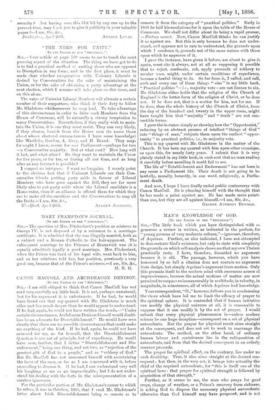"THE NEED FOR UNITY."
[TO THE EDITOR OP T3 E " SPECTATOR:]
SIR,—Your article at page 539 seems to me to touch the most pressing aspect of the situation. The thing we have got to do is to find a practical method of uniting those who are opposed to Disruption in any form ; and in the first place, it must be made clear whether co-operation with Unionist Liberals is desired by Conservatives for the sake of maintaining the Union, or for the sake of obtaining a party advantage at the next election, which I assume will take place on this issue, and on this alone.
The votes of Unionist Liberal Members will alienate a certain number of their supporters, who think it their duty to follow Mr. Gladstone whithersoever he may lead. To take advantage of this circumstance in order to drive such Members from the House of Commons, will be naturally a strong temptation to many Conservatives. Nevertheless, if they really wish to main- tain the Union, it is one they must resist. They can very likely, if they choose, banish from the House men (to name those about whose electoral circumstances I have some knowledge) like Westlake, Gordon, A. Grey, and H. Brand. They may, for aught I know, secure for one Parliament—perhaps for two —a Conservative majority. But at what cost? How long will it last, and what after P Do they want to maintain the Union for five years, or for ten, or during all our time, and as long after as any forecast is possible ?
I suggest no intrigues. I want no bargains. I merely point to the obvious fact that if Unionist Liberals see their Con- servative friends putting party aside is favour of Liberal Members who have gone against the Bill, they are far more likely also to put party aside where the Liberal candidate is a Home-ruler, than if an alliance is offered them for which they are to make all the sacrifices and the Conservatives to reap all the fruits.—I am, Sir, &e.,




































 Previous page
Previous page